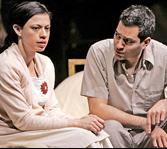SEARCH
REVIEWS
FEATURES
NEWS
Etcetera and
Short Term Listings
LISTINGS
Broadway
Off-Broadway
NYC Restaurants
BOOKS and CDs
OTHER PLACES
Berkshires
London
California
DC
Philadelphia
Elsewhere
QUOTES
On TKTS
PLAYWRIGHTS' ALBUMS
LETTERS TO EDITOR
FILM
LINKS
MISCELLANEOUS
Free Updates
Masthead
Writing for Us
A CurtainUp Review
points of departure
By Brad Bradley

Alfredo Narciso & Sandra Delgado)
(Photo: Carol Rosegg) |
The rather formal and stiff dialogue is deliberate, and more often than not, the characters seem to be totally unable to connect; thus, comparisons with the alienating worlds of both Franz Kafka and Samuel Beckett are entirely in order. The inability of the characters to find fluid conversation also brings to mind the earlier work of Harold Pinter, in which the pauses between words are potentially as meaningful as anything that is said. "Are you home?" "Who is home?"
Much in the background of Act I is Petrona, a maid in a hotel; she has no more to say to Marquez than one would expect from a staff functionary to a lodger. She does, however, voice her thoughts in the form of passionate monologues sung in Spanish. In Act II, which in many respects seems like a new play altogether, Petrona is a considerably more interesting, conflicted, and an absolutely loquacious character. Her unexpected stream-of-consciousness recalls Joyce’s Molly Bloom, although Petrona’s concerns are not by any means centered on sexual matters. By this time in the play, Marquez has disappeared, as have other characters that seemed central only minutes earlier. And we have changed to a different and intentionally less precise location, "a U.N. camp near the border — and other places in Petrona’s imagination." Added is another woman, Leti, who has befriended the distressed Petrona. Although Leti mostly remains hunched in a corner of the stage, she periodically emerges to assume Petrona’s singing function, and her plaintive, almost pleading songs in Spanish underscore the political and economic oppression of these women in particular and inferentially the citizenry in general.
Garcés’s play is clearly a bold and worthy work, and the performances are stellar, especially of Sandra Delgado and Marisa Echeverria as the two women who become the focus of the piece after the intermission. While this work is heavy duty engagement on the part of the audience and at times is overwhelming in its obliqueness and mystifying in the limited dimension that the text provides its characters, the masterful staging and performances make it often compelling and even mesmerizing. Director Ron Daniels has chosen a minimalist approach to the production, which appropriately puts emphasis on his actors, achieving remarkable levels of tone, mood, and intensity. His primary concession to production values is the apt and valuable music created by Cristian Amigo, who plays his own compositions on guitar while seated onstage.
|
points of departure
Written by Michael John Garcés Directed by Ron Daniels Cast: Alfredo Narciso, Sandra Delgado, Mateo Gómez, David Anzuelo, Antonio Suárez, and Marissa Echeverría. Set Design: Mikiko Suzuki Costume Design: Meghan E. Healey Written by Michael John Garces Lighting Design: Paul Whitaker Sound Design: David M. Lawson Composer and Guitarist: Cristian Amigo INTAR Kirk Theater at 410 West 42nd Street (Theatre Row complex) 212- 279-4200 or www.intartheatre.org From 3/07/06 to 4/16/06; opening 3/19/06 Tuesday-Saturday at 8; Saturday and Sunday at 3. Running time: 2 hours, 30 minutes including one intermission. Tickets: $40; $25 for members Viewed by Brad Bradley at Saturday, March 18 evening preview. |
The Internet Theatre Bookshop "Virtually Every Play in the World" --even out of print plays

Easy-on-the budget super gift for yourself and your musical loving friends. Tons of gorgeous pictures.

6, 500 Comparative Phrases including 800 Shakespearean Metaphors by our editor.
Click image to buy.
Go here for details and larger image.








